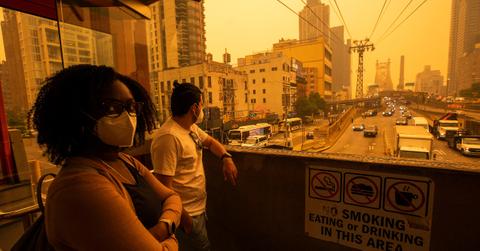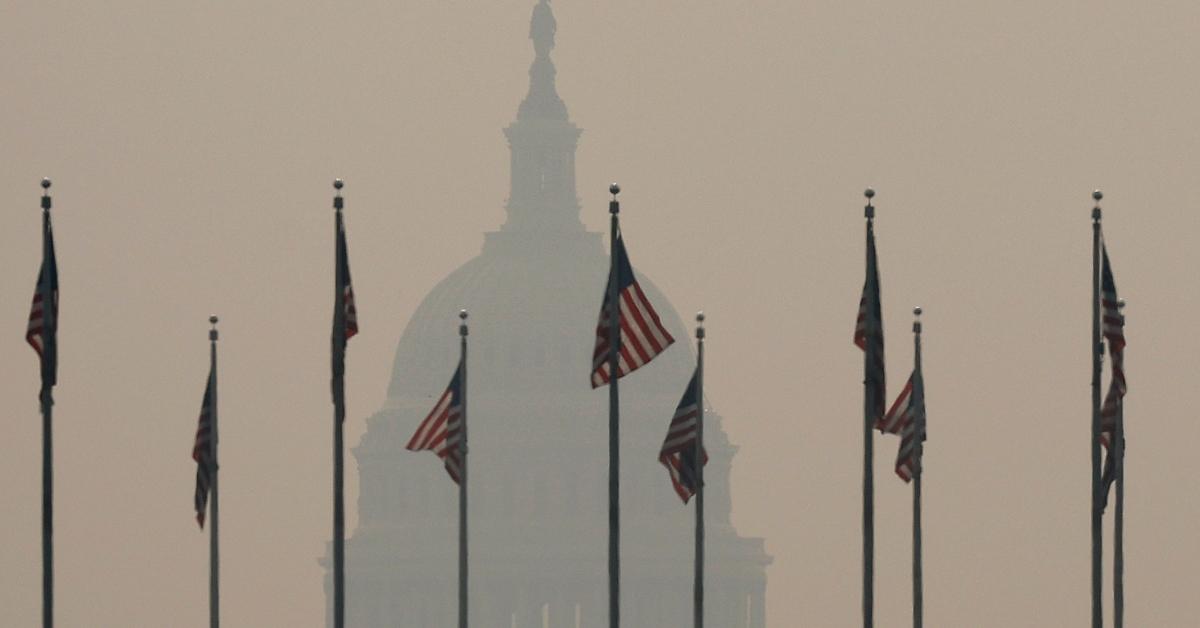Mask Up! What Experts Recommend For Wildfire Smoke Protection
Wildfire smoke's impact on your health, even after short-term exposure, is no joke.
Updated Jan. 14 2025, 10:05 a.m. ET

Wearing protective masks became commonplace thanks to the coronavirus pandemic as a method of reducing transmission, but they are also used to protect people against general airborne particulates that might be harmful. If you've ever sprayed an aerosol paint or sanded wood, you've likely used a mask.
Masks can also help protect against exposure to pollutants in the air like wildfire smoke. Especially in light of the haze from the Canadian wildfires in 2023 and the Los Angeles wildfires of 2025, let’s consider what masks to wear to protect against wildfire smoke.

What masks should you wear for wildfire smoke?
Experts recommend N95 face masks over all other types when it comes to protecting yourself from wildfire smoke. When properly fitted over your nose and mouth, the N95 can filter 95 percent of smoke particles, reports the California Department of Public Health.
Research gathered by Wirecutter found that KN95 masks are also effective at filtering out smoke from wildfires, but slightly less protective than N95 masks.
If you don’t have an N95 or KN95, some experts say any type of mask is still better than nothing. However, as noted during the early coronavirus pandemic, not everyone is selling legitimate masks — according to the New York Times, keep an eye out for masks that are missing approval numbers, have no branding, or have official terminology used incorrectly.
"If you can stay inside, that's the best bet,” New York State Acting Health Commissioner Dr. James McDonald told CBS News in June 2023. “If you do have to go outside — I have my N95 on me. I, quite frankly, encourage people to have theirs. Any mask will do. Use the best mask you can."
Is climate change causing wildfires?
The climate crisis is to blame, in part, for the increasing frequency and size of wildfires worldwide, says environmental activist Maya van Rossum. Van Rossum is the founder of the national nonprofit Green Amendment For the Generations and leader of the regional advocacy organization Delaware Riverkeeper Network.
"The smoky air that is a danger to human health – particularly the young, the old, the immunocompromised, those with asthma and heart issues — is the most recent example of how the climate crisis is touching, threatening and harming communities across our nation, Van Rossum said in a statement sent to Green Matters.
“Those who feel they are not impacted by the climate crisis are forced to reconsider as the smokey air drives them indoors in order to protect their own health or every time they experience or read in the news about the next big flood, drought or wildfire," she added.

How does wildfire smoke impact your health?
According to the U.S. Environmental Protection Agency (EPA), short-term exposure to wildfire smoke, such as over a few days, can cause the following symptoms:
- Difficulty breathing
- Bronchitis
- Coughing
- Irritated eyes
- Increased risk of asthma
- Heart attack
- Stroke
People who might have an increased risk of illness due to wildfire smoke, per the Centers for Disease Control and Prevention (CDC) include:
- First responders
- Children
- Pregnant people
- People with conditions such as diabetes, asthma, COPD, kidney disease, or heart disease
This article, originally published on June 9, 2023, has been updated.
